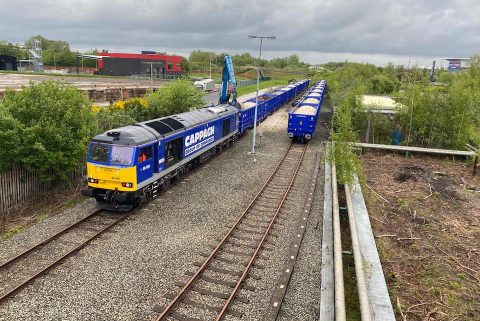DB Cargo: ‘Single wagon transport continues, jobs are safe’, says Nikutta

DB Cargo is going through some challenging times that have raised concerns regarding its future. Single wagon traffic is deemed unprofitable and could reduce massively, while an avalanche of lost jobs could hit the company’s personnel because of this development. “These are all just speculations”, stated DB Cargo’s CEO, Sigrid Nikutta, claiming that the company is on the right track to survive the ongoing crisis.
Negative performance and financial losses have been characterising DB Cargo’s annual results for some years now. Nikutta’s term as the company’s CEO and DB Group’s board member for freight transport was renewed in 2022 after four successful years precisely for this purpose: to bring DB Cargo’s performance back to black and shift more cargo on the rail.
Currently, the state-owned cargo subsidiary has set the goal to return to positive figures by the end of 2024. This ambition is contested by many sceptics who consider it unrealistic. Others, like Jörg Hensel, chairman of the European Works Council (EWC) of DB, have said this could be a “suicide mission”.
That is because a financial rehabilitation plan combined with reduced state funding for DB Cargo could result in some rough decisions. These decisions would include, for instance, scaling down or stopping unprofitable businesses like single-wagon transport and thus removing thousands of job positions from the market. Yet DB Cargo’s head claims that considering such scenarios is unnecessary and speculating about them just causes insecurity.
Does federal funding save the day?
DB Cargo is in the eye of the storm. Consequently, it’s typical for unpleasant scenarios to emerge in such cases. This could also be the result of reports that the company’s international subsidiaries are not performing well. How could the company secure thousands of jobs if single wagon transport falls out, one could wonder. Nevertheless, Nikutta reassured publicly that this would not happen. “The cargo board of directors is not planning to break up single-wagon traffic”, she stated.
Moreover, she continued explaining that “ […] the operationally complex single wagon transport is currently not economically viable in any European country. However, it plays a central role at DB Cargo since it is fundamental to achieving climate targets”. Thanks to federal funding, as submitted in Germany’s 2024 state budget planning, single wagon traffic will be given one more chance. “The entire railway industry has campaigned for single wagon traffic to be promoted in Germany neutrally in terms of competition. This is a milestone that the federal transport ministry reached with the 2024 state budget”, added Nikutta.
As a result, business as usual and extra funding mean secure jobs. Nikutta stressed that “public speculation about massive job cuts at DB Cargo is unsettling the company’s employees and customers”. They also harm DB’s goal of getting more goods from road to rail. She concluded by appeasing that DB’s heads are “convinced that they will be able to solve the challenges” and that the company is on the right track thanks to its team.




